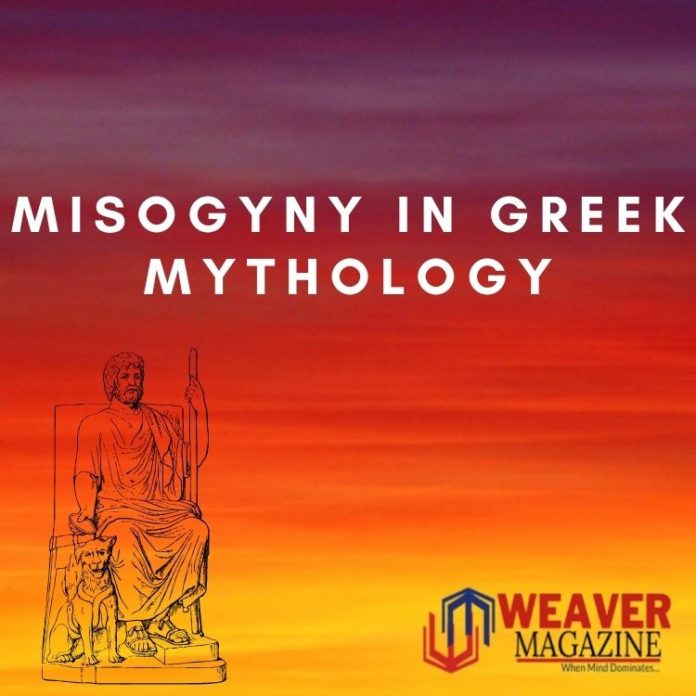Greek Mythology remains to be one of the most revered, popular myth bodies of all times, highly regarded even in postmodernist times, so it is not a surprise why there are so many interpretations and adaptations revolving around it present today. Ancient Greece was a truly fascinating placement, which sheltered and gave birth to countless adept artists, scientists, philosophers, and writers. However, at a closer survey of the works that these artists have created, we find traces of a repulsive, hateful notion- Misogyny.
Misogyny’s literal definition is ‘dislike of, contempt for, or ingrained prejudice against women.’ – but the concept on paper is much more heinous and noxious in its nature. The Greeks have created trailblazing works of arts and literature- which were revolutionary in a sense-for without which a void would have contrived itself in History itself, for without which Arts and Culture in Europe would have been incomplete, in the most abhorrent sense. However, one cannot morally appreciate these works without noting the sexism latent in them.
Greece, in prehistoric times, was nary different from other nations of those times. It doubtlessly was a male-dominated, patriarchal region. To study how misogyny prevailed in and polluted the rather beautiful Hellenistic culture, we must first understand the origin of Greece and how it incorporated misogynous undertones, along with the recurrent sexist tropes that are observed in almost any Greek work of art.
We start by examining the lifestyle and roles of women in Ancient Greece. Women were controlled by their male counterparts and relatives at almost every stage of their lives. They were deprived of political rights and were socially considered inferior to men. Their more important roles and obligations included household duties, being subservient wives, serving to appease their husband’s needs, and of course, bearing (male) children.
The Greeks were densely religious people. So, it is in the study of this concept, rational to believe that the lifestyle they followed, the gender roles they had, the family dynamics imposed, were influenced by the values of their pantheon. The Greek Pantheon had Twelve Primary Deities or Gods- with the King of Kings and the God of Gods as the chieftain- Zeus or Jupiter. Zeus had fathered many, many, children, and had engaged in countless amorous relations with women, female nymphs, dryads, and other fellow goddesses. Taking into consideration the astronomical amount of women Zeus had consummated with, it is impossible and simply unwise to believe that each woman had willingly entered into fornication with him, (especially considering how much women had to lose at that time!), but him being a God, obviously conquered whatever he laid eyes on.
Zeus alone did not perpetuate this idea of a “man”, there were numerous other gods such as Poseidon(is also known to force women into sexual relations with him), and Hades (kidnapped the queen of the underworld- Persephone), who bolstered this value- that men should take what they wanted. Now, here is where the conundrum presents itself: Men of lowly ranks who were rapists were considered ungodly and were punished severely (as they rightly should be). To counter this, let us look at the example of Hercules- a powerful, famous demigod turned to god. Hercules had accomplished many a feat and was very popular amongst the greeks.
However, he was definitely a confirmed rapist; but then, how was he forgiven for this? He was not, because this vulgarity of his was never even taken into account. It is almost as if his being godly, and of high rank erased or forgave the fact that he raped women. This perpetuated a very, very dangerous affliction: That one’s rank, power, and status could forgive his crimes against women. This is why, even today, men in power get away with crimes such as rape, sex trafficking, and murder, while others of low ranks are persecuted for their crimes alone, where instead, both should be.
With that out of the way, let’s talk about Women in Power. We will understand this with the classic example of Medusa- and how she became a monster. The more famous version of the story is this one: Medusa, a beautiful maiden had intercourse with Poseidon in Athena’s temple. Pallas Athena, enraged at this defiling of her temple, and jealous of Medusa’s beauty- cursed Medusa. (as she could not directly act against Poseidon) Medusa’s hair turned into snakes, and whoever would look upon her and into her eyes would turn into stone. But is this believable, when gender dynamics of that time are taken into account?
Athena was the goddess of wisdom and warfare. She was skilled beyond comprehension in the ways of war. Could a goddess of such intellect and cunning be swayed by the emotions( that one is inclined to believe she had power over) of Jealousy and Hatred, to act in the unjustified anger that she did? As a female goddess in the field of warfare, which was male-dominated, she would undoubtedly have to learn the art of subtlety while conveying certain messages to her other fellow male gods.
In the lesser-known story, Poseidon raped Medusa in Athena’s temple. (Do note that there was a history of conflict between Poseidon and Athena). Athena gave Medusa the gift of turning anyone she wanted to, to stone. She was granted to spend the rest of her life in solitude with her two sisters. Medusa was constantly approached by men before she turned into a monster, it is not unwise to think that she yearned for peace and privacy- contradicting the idea of the Greeks which believed women were always pining for attention for men). In the account of logic and reason, this story proves to be far more plausible.
Athena could not outright stop the rape as she would be going against Poseidon, and going against Poseidon meant going against Zeus. Zeus had asserted his power among the twelve Olympians in many incidents, any god who went against his rule would be at mercy of his wrath.
Athena disguised the gift as a curse. Through this supported the misogyny in the story, Pallas Athena had simply no other way to get out of this without losing her powers as a goddess. This is understandable as there were not many women in control during those times, women had to, had to resort to any means that they could to retain their power. They owed that much to the other women they were pledged to.
Instead, Athena was depicted as being controlled by ‘feminine’ emotions and was painted to be irrational and unwise- which women in power, always, always are painted as. This ridiculous trope that women cannot be in positions of power because they are far too ‘emotional’- even when they are not- further supports the idea of Male Supremacy, which is still embedded in the minds of many men, even today. Yes, women were frustrated and angry, because they have decades, centuries of oppressed history. We look at women who are powerful now, and we see them fighting, and on the slight chance that they do speak what they feel, they are labeled imprudent, undignified, and undeserving of their power- whereas, the same would not be said for other sexes. Women are inevitably enraged against the injustices committed against them and their sex, but someone should be, someone should be, someone needs to be.
If we talk about Greek Literature, The Iliad and The Odyssey are two of the most Classical, significant works which paved way for the tragedians, the modernists, and the post-modernists. These two works by Homer are about the decade long Achaean-Trojan War, and the journey of Odysseus after the war, respectively. However, considering the time period it was written in, it is evident that Homer was misogynistic in his philosophy with regards to gender roles; Therefore, Homer, too was intrinsically sexist in his writings. In The Iliad, there is much emphasis about the ‘works of man’ being fighting in wars, and being the breadwinner of the family, while women who aspired to be more than what they were told to be were considered ‘loud’, ‘unwomanly’ and were forced to go back to following ‘women’s ways’.
As for the Odyssey, this is one of the many examples portraying misogyny: “Penelope leaves her room to approach the assorted suitors who more or less occupy her mansion, waiting for her to give up on long-lost Odysseus and marry one of them. When she requests they stop singing such songs, she is met with resistance from the youngest male there: Her adolescent son, Telemachus, chastises her. Return to your room, he tells her; public speaking is for men.”
Another point to note is the attributes that Female Goddesses were given: For example, Pallas Athena was associated with wisdom, handicraft, and warfare, but since all these qualities were a ‘man’s’, she was also given the ‘virgin’ trait, which was far more emphasized by authors than any of her other qualities since it was a ‘feminine’ characteristic.
Aristotle is a widely known philosopher, yet, even his views are sexist. Be it by the state of inevitability, or just pure human nature, there is proof that powerful women did exist. Then why is it that not much of known of them? This is as in Ancient Greece no one spent so much time thinking about women at all. It wasn’t that there was specific, driven hate of the male public for women- but it is that they were so lowly regarded, they did not mean as much to anyone.
There was not much incentive or content that could urge people to see past stereotypes against women. As when women were popular in greek myth or history, it was not for good reasons. These examples of women which are more known to the common man cannot help us restore faith in the emancipation of the female sex: there is Pandora, who responsible for releasing all the evil upon the human race by opening a box. And Juno, who persecuted all the women Zeus had sexual interactions with in the world.
There’s Helen of Troy, who was blamed for the thousands and thousands of deaths in the Trojan War (though she was only played as a pawn and objectified after being kidnapped, she had little to no free will over her destiny). Moreover, Athena, a very significant female goddess in greek myth, is one of the most complicated characters to dissect.
In art, women were far less represented. There are almost no words that come to mind when we think of Female Greek Sculptures except Venus de Milo– which was popularised only due to the controversy around its founding. Why is it that we can only think of Male Soldiers and Gods when we think of Greek sculpture? Because back then, there was not much art neither by women nor for women. The female artists and sculptors that did exist are now forgotten, and their works probably condemned and destroyed.
Having said that, let’s talk about one feature of Greek Sculptures that is a common styling: Nudity. Men’s nudity in art was symbolized for their pride and exaltation. The expression and depiction of the Male Strength. However, for women, this was not the norm. Women were only depicted nude after Praxiteles, an Athenian sculptor sculpted a nude Venus.
Having given all these examples, it is important to talk about the women who did not follow the arbitrary obligations assigned to them by male authorities. There are so many women who were fierce warriors whose names we were never told. We have been hearing the names Achilles, Perseus, Theseus, Hercules, Hector, Paris, Alexander, since forever. Most of us know not of Cyrene, Utrera (Queen of the Amazons), Atalanta, Psyche, Medea, Ariadne, or Danaë- who were all strong female characters in Greek mythology.
There are not many adaptations or works which focus solely on these female greek heroes- though their feats are no less than any of their male counterparts. It is crucial to know their names, to learn their stories, because, contrary to what they would rather have you believe- Greek Mythology is defective, fragmentary, lost, without the roles and stories of these women. We owe the knowledge we gain from Greek Culture to these women- who did what was considered unbecoming of them- but they did it with so much courage. Courage insurmountable, and invincible- unassailable to any man who tried to break or dominate them. Our freedom to do the simplest things now- work, write, paint, even to speak freely had the price of their lives.
We owe it to them.
One cannot understand history without knowledge of them. One will only know one timeline, one story, one side. History and information have made themselves so easily available to us today. Anything, absolutely anything we want to know is at our disposal, we need only want to look for it.
Can one call themselves a Classicist, and a lover of the arts without understanding this? Can one truly study Greek Mythology, without knowing or accepting these flaws in it? One cannot. We have to strive to be better, to be more informed, to see beyond what is shown. If one is interested in the arts, one must not only study the privileged artists, who made art with nothing to lose. One must Study the oppressed. Study the oppressed, who had the world and everything more to lose, and did it anyway.
There are so many names, so many stories we are not told- find them, and lose yourself.
By Janhavi Munde













Extremely Idiosyncratic.. amazing work!
Yes! Fіnally someone writeѕ about cгedulity.